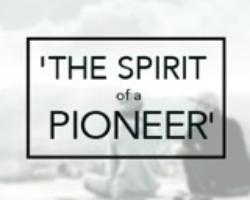About eight years ago, I packed seven suitcases, two children and my wife and emigrated from England to Texas. Invited by a pastor, who was leading an alternative model of church, my mission was to repurpose the way organized Christian religion connects with the young people of their communities. I guess I was seeking to cause a spiritual revolution.
Here I was, an Englishman crossing the Atlantic to bring about change in a different culture. The obvious question arose: Who does he think he is?
Who do I think I am that I should attempt to tell people the system is broken?
The fact is this world needs pioneers!
Pioneers create a path that previously did not exist. As in the old war movies, when a small patrol of soldiers would seek to take out an enemy’s position surrounded by barbed wire, one brave soul would throw himself over the steel mesh in order to create a path for his fellow brothers in arms.
It is the pioneers who change the world, and a recent film The Spirit of a Pioneer has been made about the Pais Project I lead and how it is changing youth ministry.
How can we encourage more people to take the risk? By helping them understand the four stages all pioneers will go through. When pioneers study the life of Jesus and how He coped in each of these four stages, they never will give up because to be forewarned is to be forearmed.
Stage 1: Revelation
All pioneers start with a revelation, and these revelations rarely come to a committee; they come to individuals.
Here’s the paradox: It takes one person to change the world, but individuals cannot do it alone.
My idea is called The Pais Project. It encourages young adults to give at least one full year of their lives to my vision. It places those young people within a team, in a church, whereby they become missionaries of their communities, working in schools and making missionaries of the young people in the church.
We offer our apprentices a free gap year with their accommodation, meals and training included. Yet it is no ordinary year because we train them to do what we were told is impossible in the United States: to reach into public schools and teach lessons.
It is exciting to see this vision grow, but there is a hurdle when sharing my vision. The problem is, at this stage people believe in you but not it.
How I got through this is told in the documentary I mentioned before.
Stage 2: Revolution
The second stage, revolution, comes as the old system begins to recognize your new idea is not going away.
In the first stage, a pioneer will suffer not persecution but patronization. He or she is looked upon as naïve, a little foolish and harmless. Pioneers often are encouraged by those in authority but with an obvious tone of friendly dismissal. In the second stage, however, rather than feeling alone, a pioneer may well feel he or she has become a threat. Those provided with status, power and financial security by the old way of doing things suddenly notice this upstart is not going away. In fact, people are beginning to take the pioneer seriously.
What I have found is that those threatened by new ideas do not persecute but gradually withdraw resources. In my case, it was platform, profile and opportunity.
Stage 3: Resistance
In stage three, the pioneer’s mission is now not only being taken up by the fringe, but the mainstream is slowly being won.
Have you ever heard the expression “If you can’t beat them, join them”? Well now the system says, “If we can’t beat them, let’s make them join us.”
Suddenly the pioneer is offered all the things he or she requirse, but with strings attached.
This is the key to resistance. You can compromise on anything but not the things that made you unique in the first place.
Stage 4: Reproduction
I believe it takes the extreme to influence the mainstream, and although the mainstream may never become as fanatical as you are, the pendulum has shifted.
I think of a group of eco-warriors in Britain who, a few years ago, lived underground in order to protect their woodland from development. I think of the middle-aged, middle-class English women who brought them lunch every day for months in plastic boxes. I remember that although they never became fanatics themselves, they became aware of the issues and campaigned in their own more conservative style.
At this stage, what once was a narrow path, trodden by few, becomes wider as it becomes the new way of doing things. The pioneer is presented with yet one more final test: the upstart has become “The Man.”
The revolutionary now has become the expert. Yet with that expertise comes authority and a new test. Will the pioneer offer the younger pioneers the opportunity and resources they so desperately need? Or, will they create control rather than a creative culture?
Summary
When the mainstream, with its resources and influence, adopts the spirit of a pioneer, there is hope for the world. Perhaps you could tell others about our free apprenticeships; perhaps we can help you create a new path in your community.
So, I encourage you to take the risk of pioneering, because pioneers are the people whom others want to hear. Pioneers are the ones who can look back and know they saw something that no one else saw…a path, not an easy path, but one with significance and one that brings fresh new results.




